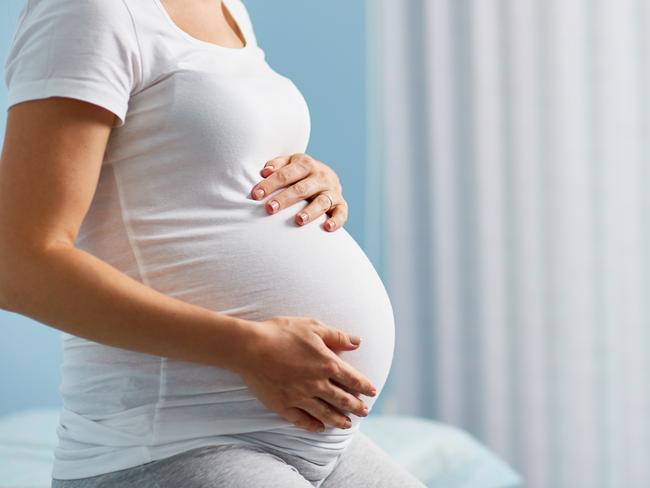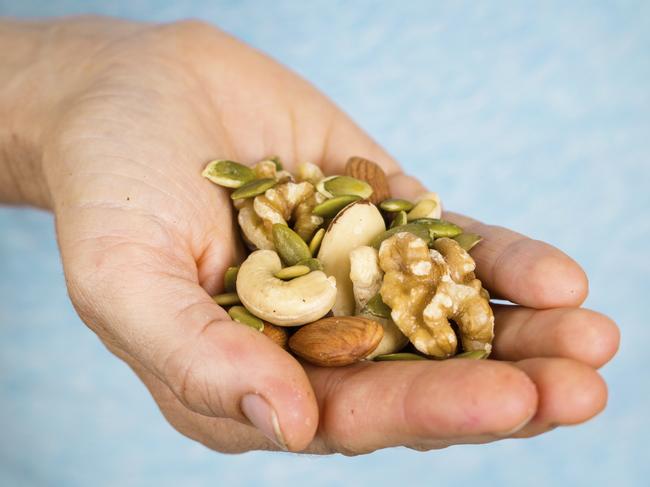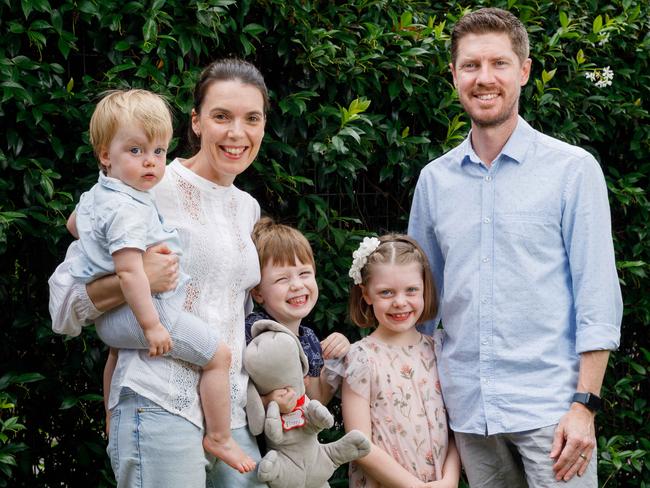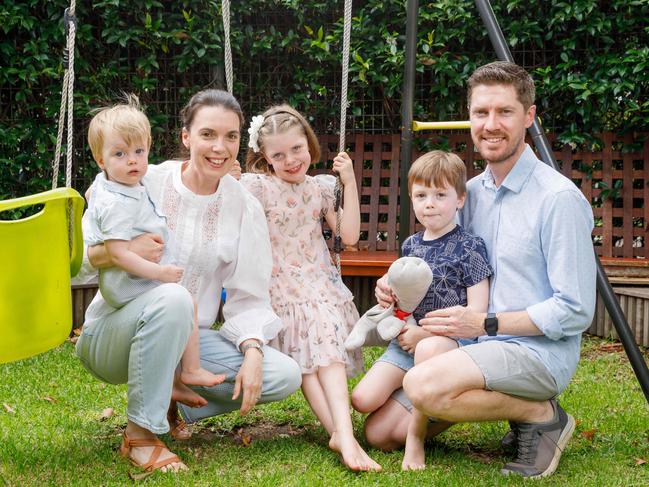How women could avoid hot flushes, stay fertile forever
A new study has suggested how women could stay fertile for life and never have to undergo menopause – and dreaded hot flushes.
Health
Don't miss out on the headlines from Health. Followed categories will be added to My News.
Women could remain fertile forever and never have to undergo hot flushes and menopause if they froze their ovarian tissue before age 30, a new study suggests.
Yale university biologist Dr Kutluk Oktay, who performed the first ever frozen ovarian tissue transplant, has predicted if the technique is improved menopause could be delayed by as much as 47 years.
The key is harvesting a woman’s ovarian tissue before the age of 30 and freezing it for later re-implantation.
This technique is currently used to help preserve the fertility of women before they undergo cancer treatments.
“Ovarian tissue freezing and transplantation has proved to be successful in cases for medical indications and resulted in over 200 live births,” Dr Oktay said.
Now he thinks the technique can be used to delay the onset of menopause.
In a study published in the American Journal Obstetrics and Gynaecology, his research team used mathematical models and knowledge about follicle loss during the transplantation process to suggest it might be possible.

The model found if a 25-year-old who had 25 per cent of her ovarian cortex tissue harvested, and then transplanted in a single operation and four in ten of the ovarian follicles survived, menopause could be delayed by almost 12 years.
If the technique was improved from the current 60 per cent survival rate for follicles to 80 per cent, menopause would be delayed by 15.5 years.
However, the researchers said if they divided the ovarian tissue into smaller bits and transplanted it in several procedures, not just one, menopause delay could be further increased.
Menopause could be delayed by as much as 47 years if eight in ten of the follicles survived during multiple transplants, the study found.
A delay this long would effectively mean a woman would not have to undergo menopause at all and might remain fertile throughout her entire life.
“Our model predicts that with harvesting at earlier adult ages and better transplant techniques, a significant menopause postponement and, potentially, fertile life span extension can be achieved by ovarian tissue cryopreservation and transplantation in healthy women,” the authors of the study said.
Not only would this eliminate uncomfortable menopause symptoms like hot flushes there is some evidence that women who experience late onset menopause – after age 55- may live longer and have a lower risk for a range of heart disease, dementia and bone loss.
HOW COUPLES CAN BOOST CHANCES OF GETTING PREGNANT
Couples who get match-fit and watch what they eat at least six months before trying to have a baby are more likely to raise a healthy child.
If they can give up smoking and alcohol, eat healthy foods – especially vegetables and nuts – and pack more exercise into their day, it will make them more fertile and improve the health of their infant.
“If we think about prevention, we might be better trained to do things in the first 1000 days than waiting until somebody is 14 and they present with high blood sugar and type 2 diabetes by which time it’s very hard to reverse what’s already happened,” obstetrician Professor Adrienne Gordon, who heads the Baby 1000 study at Sydney University, said.

WHAT’S THE PROBLEM?
A total of 51 per cent of Australian women were overweight or obese when they gave birth in 2021, placing them at risk of gestational diabetes, hypertension, pre-eclampsia and a caesarean delivery, according to the Australian Institute of Health and Welfare.
One in six pregnant women is now being diagnosed with gestational diabetes.
Being overweight can also impede a woman’s chances of getting pregnant by stopping eggs being released from the ovaries, cause menstrual irregularity and impair egg development and quality.
The children of overweight parents are at higher risk of obesity, type 2 diabetes, kidney disease and cancer.
There is also emerging evidence they could also be at risk of allergies and asthma, as well as neuropsychiatric and neuro-developmental problems.
One in four Australian children is currently overweight or obese.
BEFORE GETTING PREGNANT
Women should consider taking folate three months before conception to protect from spina bifida and possible brain damage, and also consider other supplements such as iodine if required.
It is worth having a genetic test to check if your future child is at risk of severe health conditions.
If blood sugar levels aren’t controlled around the time a woman becomes pregnant, it increases the risk of congenital abnormalities such as heart defects.
One in six Australian women is now being diagnosed with gestational diabetes, which complicates the management of their pregnancy.

WHAT SHOULD MEN DO?
It’s not just the woman’s diet, weight and lifestyle choices that matter.
Overweight men can have fertility issues, with studies showing testicular temperature is increased if they spend a lot of time sitting, they produce the female hormone oestrogen in their fat tissue, and they have and reduced sperm count.
Men planning to start a family need to lose their love handles three months before the conception date if they want to avoid fathering fat children, research by the University of NSW’s Professor Margaret Morris found.

And eating two handfuls of nuts per day may enhance male fertility by improving sperm quality rather than quantity, a recent Monash University research review found. And getting men to nip cigarette smoking in the bud before conception can have a huge impact on the baby
“If a man is a heavy smoker, his child will have a fivefold increased chance of developing childhood cancer, particularly leukaemia,” University of Newcastle reproductive expert Professor John Aitken said.
DIET DURING PREGNANCY
If you think you need to eat for two while you’re pregnant, you’re wrong – and it could be bad for you and your child if you put on too much weight.
“The whole eat for two is a myth, really,” Professor Gordon said. She recommends:
■ First trimester – Zero extra calories
■ Second trimester – Only 350 extra calories required
■ Third trimester – Just 450 extra calories required
A pregnant woman of healthy weight should gain between 11.5 and 16kg during pregnancy, according to the Royal Women’s Hospital in Melbourne. A women who is overweight when she gets pregnant should gain only 7-11.5kg. Obese women should gain even less – just 5-9kg.
TAKE OUR HEALTH CALCULATOR
HOW GENETIC SCREENING HELPED AUSSIE COUPLE
Jess and John Buchelin already had two children, but when their doctor suggested they consider a genetic screening test before their third they received shocking news.
“I came back as a carrier for cystic fibrosis. So they recommended my husband John got tested and then he came back as a carrier as well,” Ms Buchelin said.
When both parents carry the gene mutations there is a one in four chance they will have a child with the condition that clogs the body’s organs with thick, sticky mucus and leaves sufferers with a shortened life expectancy.
“I guess we had rolled the dice twice and neither children are affected,” Ms Buchelin said.

After receiving genetic counselling, the couple from the Illawara in NSW opted to undergo IVF so their embryos could be screened for cystic fibrosis.
Five embryos were created but after testing that cost $1000 per embryo only one, their son Finn, was found not to carry the gene mutation.
Associate Professor Lionel Reyftmann, a Genea Fertility Specialist in Wollongong, said “the recent decision to cover the cost of this test via Medicare will help address potential health equity concerns and minimise social and financial barriers”.
If a couple tests positive for one of these conditions they have three main options.
They can get pregnant naturally and at 12 weeks have a Chorionic Villus Sampling biopsy to test for chromosomal and genetic disorders.
Or, 14 weeks into the pregnancy, the mother could undergo an amniocentesis where a thin needle is used to withdraw a small amount of fluid from the sac surrounding the foetus to check for abnormalities.

“If there is a positive reading, you may have to decide whether or not you want to continue with that pregnancy. So that’s a very big ethical dilemma,” Assoc Prof Reyftmann said.
The second option is to undergo IVF and screen to find a healthy embryo but Assoc Prof Reyftman said this was not always simple.
“There are some people who have to do one, two, three cycles of IVF until finally we have the one good embryo,” he said.
Another alternative is to use a sperm or an egg donor who does not carry the condition but that, too, is a lengthy and expensive process.
Around 1 in 240 Australian couples will be identified as high-risk of their child being born with one of the three conditions funded by Medicare.
About two per cent of couples who have expanded carrier screening for up to 1000 conditions will be identified as having an increased chance of having a child affected with one of the conditions.
Originally published as How women could avoid hot flushes, stay fertile forever



